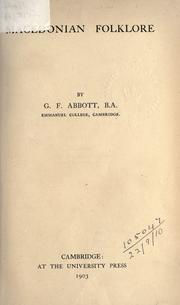Buy this book

This is a book about Greek folklore.
Millenia before Slavs arrive to Balkans, native greek populations were sharing essensially the same civilisation like their southern compatriots. During hellenistic and roman times use of the name "Macedonia", originally reffering to Aliakmon river valley, expanded to cover all Greek (and later Roman) conquests. Racial intermixing in Roman and Byzantine times, with the advent of Latin settlers from Italian peninsula and Slavs from Central Europe changed national composition in northern parts (what became Yugoslavia in more recent times). Southern parts, on the other hands, in substantial unity with the rest of the greek world retained a greek majority throughout Middle Ages and ottoman occupation.
Thus, religious and cultural aspects of the Ancient Greeks, preserved for us by the greek and roman classics, survived to the 20th century, sometimes not christianized at all, in an otherwise fervent greek-orthodox community. Northern greeks are generally thought to have preserved their cultural identity in a more pure form than the rest, mainly because they joined the greek state after the first century of its existance, escaping both national hysteria caused by Fallmerayer's theories and the state-led forced westernisation of the first years of independence, while benefiting by the progress achieved during ten decades of greek anthropological and ethnographical scholarship.
Note that G. F. Abbott's "Macedonian folklore" also has the quality of a genuine source. Written before the major events that shaped modern Macedonia, it is a field-researcher's account of the hellenic folklore during the last days of ottoman rule. Next 50 years saw a density of historical events like the epic "Macedonian Struggle / Μακεδονικός Αγώνας", two Balkan Wars, two World Wars and the Greek Civil War. Macedonia was divided between Greece, Yugoslavia and Bulgaria with each one of them annexing parts where respective populations were dominant, thus creating almost -but not entirely- homogenous nations.
After the settlement of Greek refugees from Asia Minor, local hellenic traditions suffered by intermingling and then, recent modernization influenced traditional societies heavily. Modern revivals become more and more artificial, just for the tourists and TV crews, and here lies the significance of G. F. Abbott's work. Is one of the last veritable reports about greek folklore available in English, just right before this 3000 years-old interminable tradition was wipped by the modernity of our times.
Luciano Par' Abati
Buy this book

Showing 2 featured editions. View all 11 editions?
| Edition | Availability |
|---|---|
| 1 |
bbbb
|
| 2 |
aaaa
|
Book Details
Edition Notes
The Physical Object
Edition Identifiers
Work Identifiers
Community Reviews (0)
| October 4, 2021 | Edited by ImportBot | import existing book |
| August 13, 2020 | Edited by MARC Bot | remove fake subjects |
| July 24, 2014 | Edited by ImportBot | import new book |
| December 28, 2010 | Edited by 88.218.205.173 | Added a short historical background about the relationship of book's subject and its recent fate. |
| December 10, 2009 | Created by WorkBot | add works page |










